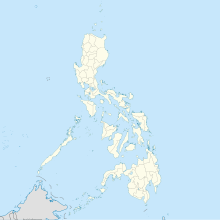Basa Air Base
| Basa Air Base Floridablanca Airfield |
|
|---|---|
| Floridablanca, Pampanga, Philippines | |

Facade of Basa Air Base
|
|
| Coordinates | 14°59′00″N 120°29′00″E / 14.98333°N 120.48333°E |
| Type | airbase |
| Site information | |
| Owner |
|
| Controlled by | Philippine Air Force |
| Condition | active, as of 2014 |
| Site history | |
| Built | November 1941 |
| Built by |
|
| In use | 1941-1945 1945-1947 1947-current |
| Garrison information | |
| Garrison |
|
|
Basa Air Base Floridablanca Air Field |
|||||||||||
|---|---|---|---|---|---|---|---|---|---|---|---|
| Summary | |||||||||||
| Airport type | Military | ||||||||||
| Operator | Philippine Air Force | ||||||||||
| Location | Floridablanca, Pampanga | ||||||||||
| Commander | Brigadier General Nestor P. Deona, AFP (GSC) | ||||||||||
| Elevation AMSL | 33 ft / 11 m | ||||||||||
| Coordinates | 14°59′00″N 120°29′00″E / 14.98333°N 120.48333°ECoordinates: 14°59′00″N 120°29′00″E / 14.98333°N 120.48333°E | ||||||||||
| Map | |||||||||||
| Location of Basa Air Base | |||||||||||
| Runways | |||||||||||
|
|||||||||||
Basa Air Base (formerly known as Floridablanca Airfield)(ICAO: RPUF), is an airbase currently operated by the Philippine Air Force. It is located at Floridablanca, Pampanga about 40 miles northwest of Metro Manila in the Philippines. It is named after César Basa, one of the pioneer fighter pilots of the Philippine Air Force.
The base was built and used by the US Army Air Corps before the Second World War and was captured and used by the Imperial Japanese Army Air Force during the early stages of World War II. Combined American and Philippine Commonwealth military forces were eventually able to recapture it during the later stages of the war.
Company B, 803rd Engineer (Aviation) Battalion, began work on what was originally known as Del Carmen Field in mid-November, 1941. It was to be major airdrome with multiple runways designed to serve heavy bombers that were to be assigned to the Philippines prior to the start of World War II. The engineers were not able to complete the field, and only the 34th Pursuit Squadron, Far East Air Force (FEAF), with its P-35 aircraft operated from there. Several P-40's from other FEAF pursuit squadrons used Del Carmen as an emergency landing strip after the bombing of Clark and Iba Fields on December 8, 1941.
In late December 1941, during the early stages of World War II, the facility was successfully captured and taken over by the Japanese Army. The base was used by the Japanese as an auxiliary airfield. It was in this aerodrome complex of Clark, Floridablanca, Porac and Mabalacat airfield where the scheme to employ "kamikaze" fighters was first conceived and launched.
In January 1945, the USAAF re-established a presence at the airfield when the United States Sixth Army cleared the area of Japanese forces. The 312th Bombardment Group (19 April-13 August 1945) based A-20 Havocs and the 348th Fighter Group (15 May-6 July 1945) based P-47 Thunderbolts and P-51 Mustangs at the airfield. In 1945, during the period of Philippine liberation to joint U.S. and Filipino troops, the U.S. Army Air Forces enlarged the airfield further to accommodate B-17s and B-24s, which were used for air strikes against Japan.
...
Wikipedia

